What Are the Signs of An Unhealthy Horse?
Library of Newsletters

Horses usually do a very good job of hiding illnesses. In fact, you may not notice any dramatic changes in your horse's appearance or behavior even if it's struggling with an illness or injury. Luckily, paying attention to a few important signs can help you decide if it's time to call an equine veterinarian.
Weight Loss
Although weight may fluctuate with the seasons and your horse's activity level, losing more than a few pounds can be a sign of a health problem. Weight loss can be caused by a variety of factors, including:
Worms and other parasites
Dental problems
Poor nutrition
Digestive issues
Stomach ulcers
Heart failure
Asthma
Liver disease
Organ failure
Infections
Laminitis or arthritis may affect your horse's ability to graze and could also lead to weight loss.
Pale Gums
Are your horse's gums dry and pale instead of wet and pink? Dehydration could be to blame. Other signs of dehydration can include sunken eyes, dark urine, and skin that doesn't snap back when pulled up gently. Extreme heat and humidity, exercise, diarrhea, or lack of access to water could cause dehydration.
If dehydration isn't treated promptly, your horse could collapse or even die. Once your horse becomes dehydrated, it may no longer feel thirsty. Offering a liquid or feed-based electrolyte solution will increase thirst and encourage your horse to drink. Your veterinarian may use a tube to deposit the solution directly into your horse's stomach.
Lack of Appetite
Has your normally ravenous horse stopped eating? An appetite change could be due to an illness, pain from an injury, mouth or stomach ulcer, dental problems, a new type of feed, or moldy hay. If your horse became uninterested in food after a move to a new stable or another change in its environment, stress could be to blame.
Lack of appetite could also be a sign of colic, a leading cause of death in horses, according to the University of Kentucky College of Agriculture, Food & Environment. Colic triggers abdominal pain that can be caused by overexertion, feeding issues, intestinal tract issues, intestinal contractions, twisted intestines, blockages, pregnancy, infections, lameness, parasites, or tumors. If your horse has colic, it may roll on the ground or lie down, seem restless, or even kick its abdomen with its hooves. Since it can be difficult to determine the cause of colic, it's important to call your equine veterinarian immediately if you notice any of these signs.
Fever
A fever is an obvious sign that your horse isn't feeling well, but how high is too high? The American Association of Equine Practitioners advises that normal resting temperatures in adult horses range from 99 to 101.5 degrees Fahrenheit, while normal temperatures for foals are from 99.5 to 102.1. If your horse's temperature is higher than the normal range, it may have an illness or infection.
A Dull Coat
If your horse's normally shiny coat has suddenly become dull or patchy, get in touch with your equine veterinarian. Coat changes could be due to poor appetite or nutrition, stomach ulcers, fungal infections, internal or external parasites, or equine Cushing's disease.
Other Changes
These signs could also mean that your horse is ill:
Changes in the amount of manure and urine produced
Disinterest in socializing with other horses or people
Swelling anywhere on your horse's body
Noisy, rapid, or difficult breathing
Coughing
Nasal discharge
Fatigue or reduced stamina
Weakness
Stiff movements
Drinking more than normal
You know your horse better than anyone else. If something doesn't seem quite right, it never hurts to talk to your equine veterinarian. Contact our office if you'd like to ask a question or arrange a visit.
Sources:
University of Kentucky College of Agriculture, Food & Environment: Colic in Horses
American Association of Equine Practitioners: Signs of a Healthy Horse
Penn State Extension: Recognizing a Healthy Horse, 2/22/2021
The Horse: Inside Information: 10 Signs of Internal Illness in Horses, 8/4/20
